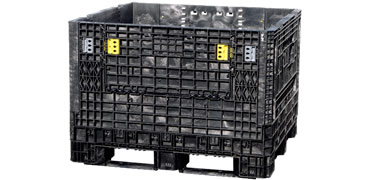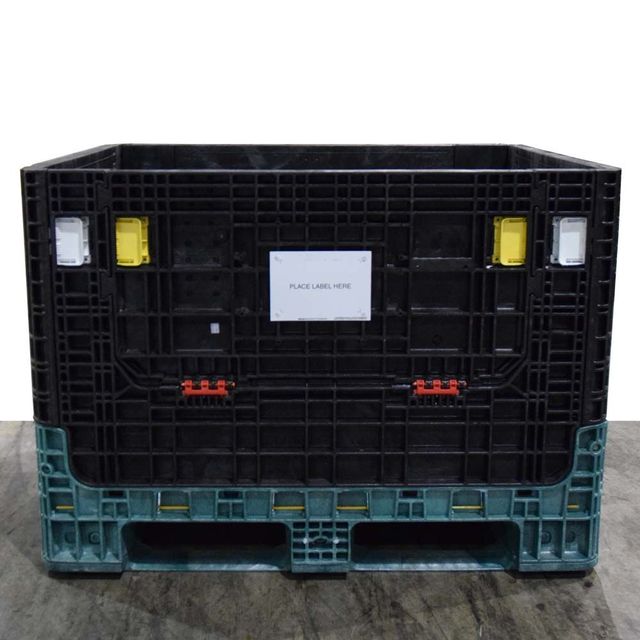Top reasons to choose used bulk containers for practical business operations
The Ultimate Guide to Choosing the Right Bulk Containers for Your Company Requirements
Picking the proper bulk containers is vital for any type of business that depends on efficient logistics. Various kinds of containers exist, each designed for details materials and applications. Elements such as dimension, material compatibility, and governing standards play a considerable function in this decision-making process. Recognizing these elements can bring about boosted operational effectiveness. Many organizations forget vital facets that can improve their general efficiency and sustainability. What are these factors to consider?
Comprehending Various Types of Mass Containers
Bulk containers function as important devices for organizations seeking reliable storage and transport remedies. These containers are available in various types, each developed to satisfy particular operational demands. One usual kind is the intermediate bulk container (IBC), which is optimal for granulated and fluid products, using an equilibrium of capability and maneuverability. One more prominent option is the mass bag, or FIBC, suitable for dry, flowable products. These versatile containers are light-weight and can be easily delivered and saved. For heavier products, rigid bulk containers are commonly utilized, giving resilience and stability for secure handling. Additionally, there are specific containers tailored for hazardous materials, making certain conformity with safety and security regulations. Comprehending the distinct attributes of these bulk container kinds enables organizations to make informed choices that optimize logistics and lower expenses. By choosing the right container, firms can improve their operational effectiveness and simplify their supply chain procedures.
Key Product Factors To Consider for Bulk Containers
When choosing bulk containers, it is necessary to consider the materials utilized in their construction. Aspects such as toughness, sturdiness, and chemical compatibility play an important role in making sure the containers satisfy certain operational demands. In addition, weight and transportability problems can influence both efficiency and transportation logistics.
Product Toughness and Toughness
Longevity and strength are crucial variables in selecting products for mass containers, as they straight affect the container's capability to withstand numerous environmental problems and taking care of processes. Materials such as high-density polyethylene (HDPE), polypropylene, and stainless steel are generally favored for their robust residential or commercial properties, using resistance to effect, temperature level, and abrasion fluctuations. The choice of material likewise influences the overall lifespan of the container; more powerful materials typically result in less constant replacements, resulting in set you back financial savings over time. Additionally, the weight of the product can affect shipping expenses and simplicity of handling. Organizations need to consider their details functional environments and the capacity for damage to guarantee peak durability and strength in their bulk container option.
Chemical Compatibility Variables
Recognizing chemical compatibility is vital for selecting mass containers, as the products made use of need to stand up to the details materials they will certainly hold. Numerous aspects affect compatibility, including the chemical nature of the components, temperature, and period of storage. Corrosive chemicals may need containers made from stainless steel or specialized plastics that withstand degradation. Additionally, reactive substances can create warm or gases, requiring vented or pressure-rated containers. The option of container material, whether steel, polyethylene, or polycarbonate, ought to align with the chemical buildings of the saved substances to avoid leakages or violations. Inevitably, an extensive analysis of these compatibility aspects guarantees risk-free handling and storage space, securing both personnel and the setting while preserving product stability.
Weight and Transportability Problems
Selecting bulk containers includes not only examining chemical compatibility yet also thinking about weight and transportability. Companies need to assess the simplicity of handling and transportation to enhance performance. Lightweight materials like high-density polyethylene (HDPE) or light weight aluminum can promote less complicated motion and decrease delivery prices. On the other hand, much heavier containers might supply boosted resilience however can prevent mobility, specifically in atmospheres requiring regular relocation. Additionally, the layout of the container need to allow for hassle-free training and stacking, ensuring ergonomic safety and security for employees. Companies ought to also take into consideration the facilities available for transportation; as an example, containers compatible with forklifts or pallet jacks can improve procedures. Ultimately, the best equilibrium in between weight and transportability directly influences functional effectiveness and expense effectiveness.
Sizing Your Bulk Containers for Optimum Effectiveness
When sizing mass containers, companies have to carefully analyze the measurements required to accommodate their specific items. Furthermore, weight ability is a vital factor that affects performance and safety and security during transport and storage. Efficient sizing not only makes the most of area but also enhances functional process.
Establishing Container Capacities
Choosing the ideal dimensions for mass containers is essential for making best use of performance in storage space and transportation. Organizations must assess their particular demands, taking into consideration variables such as readily available room, the nature of the goods being kept, and the approaches of transportation made use of. Exact dimensions ensure that containers fit ideally in storehouses and cars, lessening thrown away space and lowering managing time. Standard sizes can offer convenience, but custom measurements could be essential for one-of-a-kind needs or to fit certain products. In addition, it is very important to assess piling capacities and accessibility, as these aspects affect total functional effectiveness. Eventually, the appropriate dimensions bring about improved company and streamlined logistics, benefiting the general performance of the business.
Weight Ability Considerations
Understanding weight capacity is crucial for companies intending to maximize their bulk container efficiency. The weight capability of a container directly impacts storage space capacities, transport logistics, and total operational expenses. Picking containers with the suitable weight limits guarantees that companies can safely keep and move their goods without running the risk of damages or conformity issues. Straining containers can lead to architectural failures, while underutilizing capacity outcomes in squandered sources. It is necessary for businesses to assess their product weights and think about any type of regulative requirements when picking containers. Additionally, elements such as the sort of material, meant use, and more info environmental problems ought to additionally influence weight capability choices. By assessing these elements, companies can boost performance and ensure a structured supply chain.
Governing Conformity and Safety And Security Requirements

Regulative conformity and safety requirements play a crucial role in the option of mass containers for businesses. Organizations needs to guarantee that their containers fulfill various guidelines set by neighborhood, national, and global authorities. These criteria frequently relate to product security, architectural stability, and proper labeling, which help prevent crashes and ensure the secure transportation of goods.
Additionally, adherence to industry-specific guidelines, such as those from the Food and Drug Administration (FDA) or the Occupational Safety And Security and Health And Wellness Management (OSHA), is critical for business dealing with dangerous materials or foodstuff. Non-compliance can cause penalties, lawful concerns, or damage to a company's reputation.
Companies need to likewise think about the container's compatibility with the products being saved or delivered to prevent contamination or chemical reactions (refurbished bulk containers). To sum up, recognizing and applying regulative compliance and safety criteria is important for the liable and reliable use bulk containers
Sustainability Alternatives for Eco-Friendly Bulk Containers

Firms are additionally discovering options made from recycled materials, which not just conserve sources yet also support the recycling industry. Innovations in design enable for lighter containers that need less energy to transportation, better boosting sustainability. By integrating these eco-friendly mass container options, services can show their commitment to environmental stewardship while meeting consumer need for sustainable methods. This change not only helps the planet however can likewise improve brand online reputation and customer loyalty.
Cost-Effectiveness and Budgeting for Bulk Containers
While numerous organizations focus on sustainability, cost-effectiveness continues to be an important element when picking mass containers. Organizations has to evaluate the preliminary purchase cost, as well as long-lasting functional prices, to guarantee financial feasibility. Variables such as reusability, durability, and upkeep play a substantial duty in determining general costs.
Buying top notch containers may yield higher ahead of time costs yet can bring about savings through reduced replacement rates and reduced waste. Additionally, services must take into consideration transportation costs and storage space efficiency, as these can influence the total budget plan.

Frequently Asked Questions
Just how Do I Establish the Right Container for Hazardous Materials?
To determine the best container for harmful products, one have to review compatibility with the material, consider the container's material, look for regulatory conformity, and examine capability and safety and security features to assure appropriate handling and storage.
Can Bulk Containers Be Personalized for Details Products?
Yes, bulk containers can be customized for certain items. used plastic containers. Numerous features, such as product, dimension, and style, can be tailored to meet distinct needs, ensuring perfect safety and performance for moving and storing various items
What Is the Ordinary Life-span of Various Mass Container Types?
The average life-span of bulk container kinds varies; plastic containers last 5-10 years, steel containers 10-20 years, and wood containers usually last 3-7 years, relying on use, maintenance, and ecological conditions.
Just how Should I Tidy and Maintain Mass Containers?
To cleanse and preserve bulk containers, one need to frequently check for damage, remove residue, clean with proper cleaning agents, wash thoroughly, and guarantee proper drying out before storage. Following producer standards enhances long life and security throughout use.
Exist Rental Alternatives for Mass Containers Available?
Yes, many companies use rental alternatives for mass containers, giving adaptability for services. These leasings can accommodate different demands, allowing business to handle inventory efficiently without the commitment of purchasing containers outright.
Toughness and strength are essential variables in selecting products for mass containers, as they directly influence the container's capacity to hold up against various environmental conditions and managing processes. Understanding chemical compatibility is necessary for choosing bulk containers, as the products made use of need to stand up to the certain substances they will certainly hold. Recognizing weight capability is crucial for organizations aiming to enhance their mass container efficiency. Regulatory compliance and security standards play an important duty in the selection of bulk containers for services. While several organizations concentrate on sustainability, cost-effectiveness stays a critical factor when choosing bulk containers.